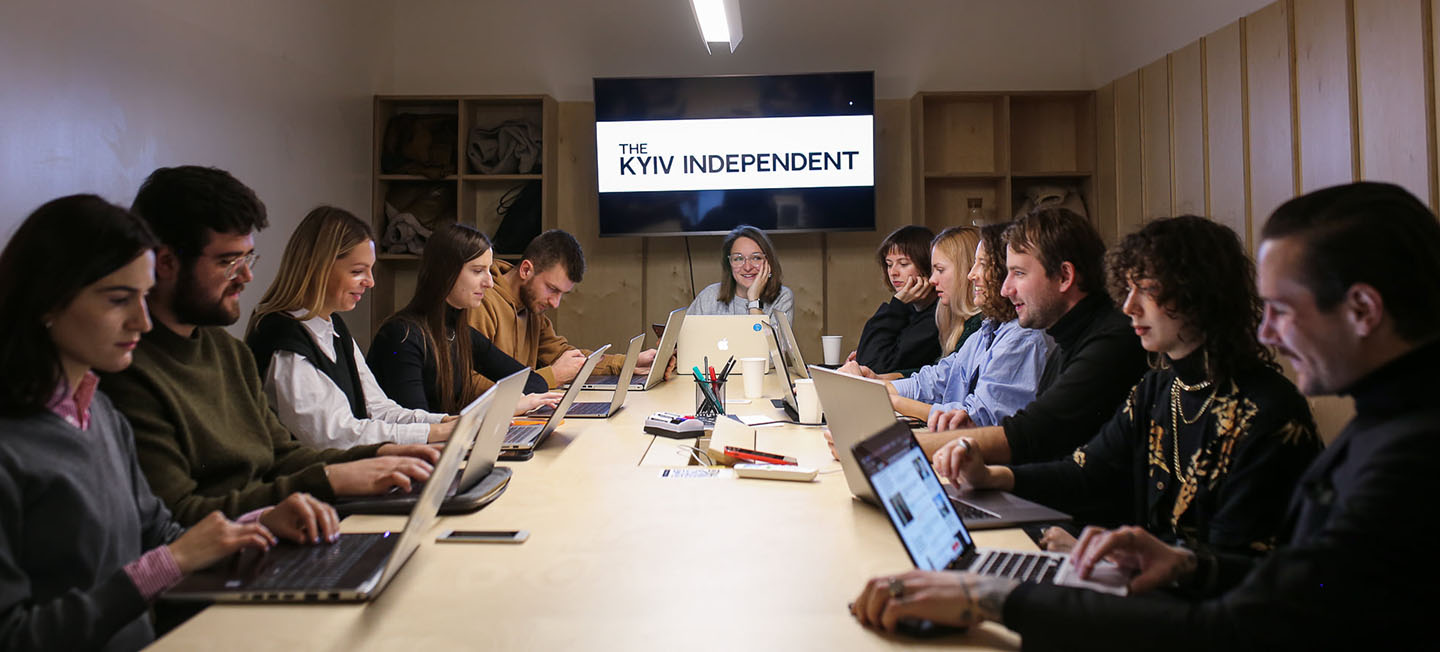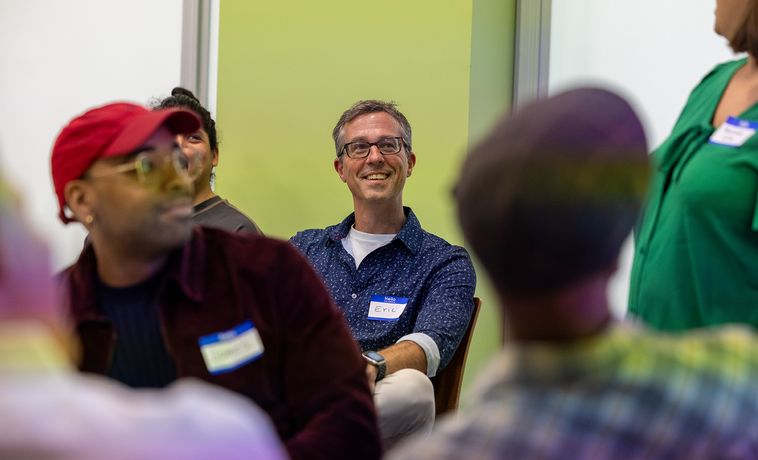The fight for independent news in Ukraine
When an oligarch took over and temporarily closed the independent English language Kyiv Post, members of the editorial staff — including BU grad Elina Kent — left and launched their own news site.

The team of The Kyiv Independent. Photo by Volodymyr Petrov.
Ukraine is making daily headlines, but that doesn’t mean Americans understand what’s happening in the Eastern European country. Elina-Alem Kent learned that as soon as she told classmates that she was going to Ukraine—a country where she’d spent three years of her childhood—for a school break.
Some of those friends, aware of the war sparked by Russia’s 2014 invasion and annexation of the southern region of Crimea, feared for her safety even though she was going to the northern capital of Kyiv. Others assumed the conflict was over and Russian troops were gone. Kent (Pardee’19) wondered how she could help her friends understand the country’s complicated geopolitical history—so she produced a podcast, providing a primer on Ukrainian history and telling the stories of people displaced by the war.

Though Kent wasn’t a COM student, she worked on the student radio station, WTBU, where she became music director. There she met Anne Donohue, an associate professor of journalism and the station’s faculty advisor, and began frequenting her office hours to talk about her project and get advice on audio storytelling.
Now Kent, a Ukrainian based journalist, is producing a very different podcast, Media in Progress for the Kyiv Independent. Since November 2021, she has been documenting the launch and growth of the Independent, an English-language news site created by the former staff of the Kyiv Post who were fired en masse following a disagreement over editorial staff hiring policies.
The Independent’s story has unfolded on the backdrop of another potential Russian invasion, with a growing military force staged along the Ukrainian border and world leaders scrambling to figure out Russian president Vladimir Putin’s intentions.
Kent spoke with COMtalk about the importance of independent journalism in Ukraine and the scramble to keep it alive at the Kyiv Independent.
Q&A
COMtalk: You studied international relations at BU—when did you become interested in journalism?
Kent: It was an accident. I knew that I didn’t want to go into government or policy. Communications and anthropology—that’s what drives me and what interests me. A family friend, who’s a prominent journalist from Ukraine, said, “What if you tried journalism? There’s a need for it in Ukraine—especially English language journalism.” And the podcast that I made was the reason why I got hired at the Kyiv Post.
COMtalk: What was the Post’s reputation when you were hired?
Kent: It had been a highly respected newspaper since 1995. It was one of the only English independent news sources in Ukraine. We had about 30 journalists and there was this beautiful mix and balance between foreigners, English native speakers and Ukrainian journalists. Adnan Kivan had bought the paper a year and a half prior to when I arrived.
COMtalk: Why is independent journalism so important in Ukraine?
Kent: Ukraine doesn’t have the best reputation when it comes to the media. Since the 1990s, there’s been around 13 journalists killed here. And while there is freedom of the press, not all media is independent. Ukraine has this oligarch problem—a lot of oligarchs love to buy news channels and newspapers, and it’s hard for media organizations to survive without their funding. That’s why the Kyiv Post was such a gem. We criticized the government and politicians when needed. With the amount of propaganda that people receive because of Russia, it needs to be combated every day. So it’s vital.
COMtalk: Can you explain what happened at the Post last year?
Kent: There are multiple theories. One factor was that the Post had published some critical op-eds about Iryna Venediktova, Ukraine’s general prosecutor, and she started a defamation lawsuit. Once another critical article came out, she opened an investigative case against the owner. Within a month’s time, the Post was shut down. Another factor was that Kivan wanted to launch a TV channel and he appointed an editor. We never had anyone appointed to any position—everyone goes through a rigorous interview process. He decided it would be easier to shut down the newspaper and fire everybody, then reopen it a month later with a new team. After three days of negotiating, we realized that there was no way to save the Kyiv Post, no way to save its values. We decided to take those values and create our own media startup, called the Kyiv Independent. Meanwhile, there were 100,000 new Russian troops at the border and there was no news being written about it. It was just insane timing.
COMtalk: How quickly did the Independent come together?
Kent: Very quickly. We realized that it was important to cover this build up of Russian troops. We were all fired on November 8. Seven days later, we were releasing our volunteer-made newsletter called Ukraine Daily. By the second week, we had started the podcast, Media in Progress. And by the third week we had released our website. There was absolutely no sleep.
COMtalk: You’ve now had the site up and running for a couple of months—is it a sustainable business yet?
Kent: Not completely. We finally got our first salary, nowhere close to what we had at the Post, but something at least and some people can only afford to be part time. And I can’t say much about it, but we have been talking to investors. We are very much looking forward to being financially independent and not relying on one owner or one major investor so that there’s no situation like at the Post—and many other media organizations in Ukraine—where you have one person wanting their news media organization to help them.
COMtalk: In addition to the oligarch problem you mention, what other challenges can independent media counter in Ukraine?
Kent: Ukraine is a bilingual country. It speaks both Russian and Ukrainian. In the west, you have a very national Ukrainian feeling; in the east, the majority of people speak Russian. After graduating, I started a documentary about eastern Ukraine. When I was there, the television was full-blown Russian propaganda. This rhetoric is being fed into news channels and polarizing people, because you have this huge community of people that still believes that the [days of the former] Soviet Union were the golden days. It’s very similar to what’s happening in the U.S., where you have news polarizing people to make sure that they’re not united and that they can’t work together to create a stable democracy.
COMtalk: Obviously, Ukraine is in the headlines a lot right now. What’s it like there?
Kent: In the beginning, the U.S. Embassy was sending out messages. You know, “Be careful, there might be a war.” Meanwhile, Ukrainians were kind of like, “We’ve always been at this level of alertness.” There was a similar buildup last summer and now it’s happening again: troops are building up, there are [diplomatic] talks. So in one sense, [Russian President Vladimir] Putin is able to use this tactic in order to influence the West. A lot of what he does is to get reactions from people: When people are unsatisfied with him or his government, he does something like a buildup of troops, and when there’s a reaction from the West, like sanctions, he uses that in propaganda and his ratings go up. After a while, things settle down and the cycle happens again. So that’s one aspect. The other is that he views Eastern Europe and Eurasia as his territory and he really doesn’t want his borders to become more democratic, so he’s trying to create buffer zones around his authoritarian regime.
COMtalk: Why is Russian propaganda so readily available in Ukraine? Are there Russian-owned or controlled media outlets there?
Kent: Well, you could find Russian propaganda anywhere. You can find a lot in the U.S. media and social media. There was a Russian version of Facebook that people here used a lot—that has now been since banned in Ukraine. There was a bunch of Russian disinformation about coronavirus, about vaccines, because they don’t want Ukrainians to be informed about what’s happening with coronavirus. I don’t know whether or not they want more Ukrainians to die or they want them to be more vulnerable. But there was an investigation that revealed there was a huge amount of Russian disinformation concerning the pandemic that was being specifically sent to Ukrainian social media spheres.
COMtalk: We’ve spoken a lot about business and politics, but neither is what you cover. Beyond the podcast, what do you enjoy covering?
Kent: My love of Ukraine is because of the culture. One of my favorite moments as a journalist was meeting a person in the eastern region who creates pop-up art galleries, including in the occupied cities of Donetsk and Luhansk, by hanging artwork in war-torn structures. I wrote about them and someone at the German Embassy read it. The German consulate went all the way to the eastern city where they’re at, and said “We’re willing to support you in any way, shape or form.” That made me feel really good.



